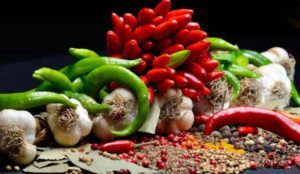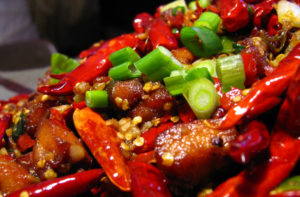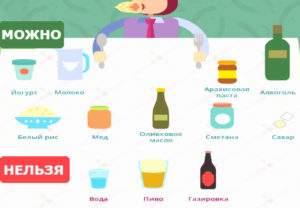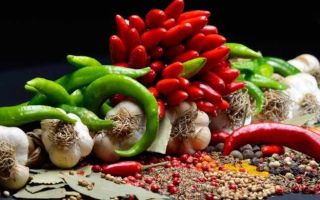Content
Hot spices and seasonings are in great demand because they add variety to the diet and reveal the facets of the taste of familiar foods. In the love of the sharp, real passions can flare up. There are even specialized restaurants for lovers of, for example, pepper dishes. However, not everyone realizes the consequences of satisfying such "burning" desires. The benefits and harms of spicy food is a question that nutritionists have no clear answer to. And weighing all the pros and cons, everyone finds their own, their own.
What substance makes food spicy
Before starting to study the benefits and harms of spicy food, it is worthwhile to understand a little about its composition and the mechanism for obtaining a unique taste effect.
It's all about special receptors - temperature. Surprisingly, but it is they who react with a sensation of heat to a special substance in the composition of spicy food - capsaicin.
Capsaicin is an alkaloid found in large quantities in chili peppers and in plants of the genus Capsicum. By its nature, it is a colorless crystalline substance with a pronounced pungent taste, which irritates not only the mucous membranes of the mouth and nose, but also the skin.
Capsaicin is not a poisonous product and is not harmful if ingested, however, with a strong effect of the substance on the body, useful internal defense mechanisms that are triggered can harm the body.
The concentration of capsaicin in pepper is measured using the Scoville pungency scale, according to which the value of pure capsaicin is 16 million units. The pungent properties of the world's hottest peppers on a scale are only 1.5-1.6 million units. Cayenne pepper and Jalapeno pepper have a pungency of about 8-50 thousand units.
For those people who are just starting to experiment with spicy, a useful option would be to start with a small dose, gradually increasing it depending on the reaction of the body.

Why spicy food is useful
The benefits and harms of spicy food for the body are determined by a number of its unique features.
In almost any national cuisine, you can find various kinds of dishes with the addition of spices. The use of spices and hot foods is in their properties to significantly complement the taste of food and arouse the feeling of hunger.
But not everyone knows that in addition to gustatory functions, such food has many other useful properties.
Improves the work of the cardiovascular system
Thanks to capsaicin, spicy foods have the beneficial properties of altering the state of blood vessels: due to the formation of nitric oxide, which in turn helps to dilate blood vessels,lowering blood pressure and regulating blood flow.
Experts from the Chinese University in Hong Kong conducted an experiment, the results of which confirmed the benefits of spicy food in the prevention of cardiovascular disease. Capsaicinoids in its composition tend to significantly lower the level of "bad" cholesterol, thereby preventing the development of diseases such as arteriosclerosis, hypertension, coronary heart disease.
The beneficial effect of capsaicin is also manifested in its ability to inhibit the development of cancerous tumors. Therefore, the use of a small red pepper once a week can literally prolong a person's life.
Improves Digestion
Many people believe that burning food is only harmful to the body, causing heartburn and serious digestive problems.
However, studies carried out in Asia have shown that people who did not consume food containing capsaicin at all were prone to heartburn three times more than those who actively used such foods in their diet. The very same capsaicin gives our stomach the benefits of stimulating the digestive system, burning fat and speeding up metabolism. The beneficial properties of spicy food also lie in its ability to protect the gastric mucosa from the harm of the effects of various drugs, chemical additives and toxins.
Increases appetite

It is known that spicy-salty food provokes the production of gastric juice. However, statistics have shown that, despite the ability to acutely increase appetite, lovers of such food rarely overeat. This property helps well to control the amount eaten.
Reducing salt intake
In 2010, Chinese scientists conducted a study of 700 people. It has been shown that eating hot spices with food can help reduce the harm of excessive salt intake: as a result, the subjects ate 3 grams less salt per day, and their blood pressure dropped significantly.
Helps with colds and colds
The benefits of capsaicin are manifested in its property to relieve spasm in the nasal area with sinusitis and runny nose, get rid of congestion, and also reduce the number of colds.
When your nose clogs up during a runny nose, you need to put a pinch of chili pepper in a cup of hot tea, inhale steam with your nose, and then take a sip - this will help clear the nasal passages and breathe a little easier.
In addition to the capsaicin content, spicy foods have another property that is quite useful for colds - to strengthen the nasal mucosa, thanks to the content of vitamin A, and thereby prevent the penetration of bacteria and viruses.
Eating spicy food also provokes sweating, and this will be useful in reducing body temperature, as well as to stimulate the secretion of mucus by the bronchi.
Prevents the appearance of stomach ulcers
Some people believe that eating spicy food can "burn a hole" in the stomach and cause ulcers. However, Helicobacter pylori bacteria are considered to be the real culprit in the formation of all ulcers. Capsaicin tends to help neutralize pathogenic bacteria and remove them from the body. In the course of the research, another interesting fact was discovered: people who eat Korean or Indian dishes suffer from stomach ulcers three times less than those who follow traditional food.

Helps with depression
Eating spicy foods can significantly improve mood and mental health: capsaicin in its composition helps to increase the level of endorphins and serotonin. However, it is important not to overdo it here. The best option would be to add a pinch of spices to hot tea or milk. Turmeric is considered the leader in combating depression and stress.
Improves sleep
Spicy food has warming properties. To ensure good sleep It is recommended to drink a cup of milk with a pinch of spice at night. As for fatty foods with hot spices, such a combination can result in the harm of insomnia, so you should completely abstain from a dense fatty dinner before bedtime.
Promotes weight loss
Spicy foods are classified as thermogenic foods that tend to speed up the metabolism in the body and thereby contribute to weight loss. This has been proven in studies from Canada, Denmark and the United States. In particular:
- the introduction of red pepper into the diet reduces appetite and leads to gradual weight loss;
- hot peppers tend to increase thermogenesis - the rate of fat burning by the body;
- Chili peppers on a diet give an increase in metabolic rate by 25%.
Spicy food tends to induce thirst: drinking water also helps to reduce food intake and speed up metabolism.
There is proven evidence that spicy foods can increase blood testosterone levels, which are especially beneficial for men.
The result of studying all the useful properties of burning food was the development of a sharp diet, as a rather extreme option for burning extra pounds.
Its peculiarity is the addition of red hot pepper to a predominantly protein diet. The restriction applies to calorie intake: the energy value of the daily ration should not exceed 1800 kilocalories.
The diet allows the addition of red pepper to drinks: teas (including herbal ones), coffee.
As part of the daily set of products:
- chili pepper - 1 tsp;
- dietary meat (including fish) - up to 250 g;
- unsweetened seasonal fruits - 400 g;
- Whole grain bread - 2 - 3 slices
- vegetables with a low starch index - unlimited;
- fermented milk drinks - 2 glasses;
- granular cottage cheese 20% -fat - 200 g;
- boiled chicken egg - 1/2 pc.;
- honey - up to 2 tsp.
Can pregnant and lactating women eat spicy foods?
During pregnancy, a woman's taste needs can change dramatically, as a result of which the craving for spicy and salty increases. Eating spicy food during pregnancy can be beneficial: in small quantities, such food can reduce nausea and stimulate the digestion of the expectant mother, which will have a good effect on both her and her baby's health.
However, it is not worth abusing acute because of the harm of heartburn and inflammation of the digestive system. You should also take into account the possible toxicosis - in this case, after taking spicy food, nausea and dizziness may appear.
The diet of nursing mothers in the first three months of breastfeeding is strictly prohibited, since any spicy food, if it gets into milk, threatens to burn the baby's stomach and intoxication.
In the first month of lactation, any spices are prohibited, with the exception of salt (in a very limited amount). In the fourth month, a nursing woman is allowed to include onions in the diet - after a test reaction to the product.
At 6 months, the child himself begins to try the first complementary foods: the mother is allowed to gradually introduce bay leaves and garlic into her food.
Spicy food for children

The inclusion of spicy food in the children's menu should be as careful and careful as possible, especially when it comes to hot spices. Hot spices can contain dangerous substances and acids that can seriously harm the undeveloped children's gastrointestinal tract: intestinal and stomach mucosa.To find out about the individual tolerance of a particular product by the child's body, it is necessary to consult a pediatrician and an allergist.
The list of spices strictly prohibited for children under 7 years old includes:
- horseradish;
- Chile;
- Cayenne pepper.
Garlic is approved for use by children over 2 years old, since it has the beneficial properties of a natural antibiotic and protector of colds; it is also able to improve the digestive process in the body.
The properties of spicy food affect lipid metabolism and can provoke the appearance of acne on the face and back, which is especially important in adolescence, when metabolic processes are unstable.
Why spicy food is harmful
Despite all the advantages of useful properties, spicy food has its disadvantages and contraindications.

Addictive
Some types of spicy food can cause euphoria, becoming a kind of drug for the human body. The pungency of spicy foods triggers the launch of the defense system in our brain in the form of the release of endorphins and hormones of pleasure. As a result of frequent consumption, spicy food can be addictive to food lovers, which threatens with dangerous consequences. Its regular use also harms the kidneys, since spicy foods in food can affect the imbalance in the water-salt balance.
Promotes the development of gastritis
Spicy food abuse can seriously injure the stomach wall. Capsaicin can raise the temperature in the body, which causes food to "burn" the mucous membrane, which can lead to the development of gastritis. That is why, after eating spicy food, you can feel pain in the stomach.
For the same reason, you should not combine spicy food with alcohol, which also irritates the walls of the digestive system.
Leads to heartburn
In addition to the development of gastritis, spicy food tends to increase the acidity of gastric juice, which leads to heartburn, as well as belching, bitterness in the mouth and constipation. When you observe one of these symptoms, you need to consult a doctor and undergo a course of treatment in order to avoid serious harm to the development of gastritis.
Bad breath appears
As a result of an increase in the acidity of gastric juice in the human body, the most comfortable conditions are created for the reproduction of bacteria. As a result, after eating spicy food, a specific aftertaste may appear in the mouth, and an unpleasant odor may begin to emanate from the mouth, which, as a rule, lasts for a long time. So, a lunch with garlic or red pepper can become a hindrance in communication with people around you.
Damages taste receptors

Eating spicy foods on a regular basis can disrupt your taste buds. It is this fact that can explain the addiction of a person to acute taste sensations and a decrease against their background in interest in ordinary fresh food. Such food can provoke a malfunction in the digestive system, which makes food without spices seem completely tasteless.
How to neutralize spicy foods
In the course of many studies, it has been proven that drinking spicy water is not the best option. Moreover, water can only enhance the "fire effect". It's all about capsaicin, which, under strong influence, can cause a sensation of a "burning tongue", cough, and sometimes vomiting.
To neutralize the effect of spicy food on receptors, casein protein, which contains dairy products, will be the best helper. That is why it is advised to drink in the mouth to "extinguish the fire" yogurt or milk, eat a spoonful of sour cream or ice cream. White rice, honey, olive oil and even alcohol can also moderate the body's response to spicy foods.
Conversely, carbonated drinks will aggravate the matter.

Why do people eat a lot of spicy foods in hot countries?
Many people know that spicy food is most common in southern countries.The whole secret lies in the already familiar capsaicin, one of the properties of which is a destructive effect on energy sources - the mitochondria of cells. Thanks to this, spicy spices do not quickly spoil dishes and thereby protect residents from poisoning and digestive problems, which is very important in the climatic conditions of Asia and Central America, where they are so common in cooking.
Conclusion
The benefits and harms of spicy food continue to be actively studied around the world. Despite the differences of opinion, as a result of numerous studies, it has been proven that spicy foods have a number of beneficial properties - from speeding up metabolism to preventing stomach ulcers. However, it is also worth remembering that the abuse of "warming" spices can negatively affect health - provoke gastritis, heartburn and stomach diseases.

